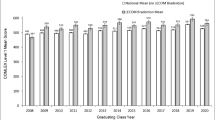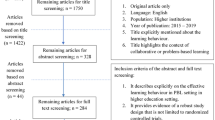Abstract
Implementation of a pedagogical approach is a continuous and evolving process. As an institution with more than 15 years problem-based learning (PBL), we studied how the learning and teaching processes are currently practiced in a 2-year preclinical basic sciences program to assess whether they still match the intended objectives. Using both students’ and tutors’ evaluations, we analyzed and compared their perceptions on the program content and its organization, on tutors’ functioning and on the duration of PBL sessions throughout 11 instructional units of the second and third-year of a 6 years medical curriculum. Whereas both tutors and students indicated that the content and problems selected for the curriculum were well adapted to the PBL process, they felt the references as well as the self-study time as moderately appropriate. Over the course of the 2-year program, tutorial sessions got linearly shorter, whereas reporting sessions got longer. While tutors knew well the PBL approach and were suitably prepared to their tutorials, they however, became less regular in providing feedback and in evaluating group functioning over the 2 years. Our results suggest that the practice of the PBL process evolves within and throughout a 2-year preclinical program and moves away from the original intentions. Possible underlying reasons and their implications are discussed within the context of tutors’ and students’ concepts of teaching and learning, the medical schools’ learning environment and teaching practices and the difficulty of developing and maintaining in the long term a deep and self-directed learning approach.

Similar content being viewed by others
References
Baroffio, A., Giacobino, J. P., Vermeulen, B., & Vu, N. V. (1997). The new preclinical medical curriculum at the University of Geneva: Processes of selecting basic medical concepts and problems for the PBL learning units. In A. J. J. A. Scherpbier, C. P. M. van der Vleuten, J. J. Rethans, & A. F. W. van der Steg (Eds.), Advances in medical education (pp. 498–500). Dordrecht: Kluwer Academic Publishers.
Baroffio, A., Kayser, B., Vermeulen, B., Jacquet, J., & Vu, N. V. (1999). Improvement of tutorial skills: An effect of workshops or experience? Academic Medicine, 74(10 Suppl), S75–S77.
Baroffio, A., Nendaz, M. R., Perrier, A., & Vu, N. V. (2007). Tutor training, evaluation criteria and teaching environment influence students’ ratings of tutor feedback in problem-based learning. Advance Health Science Education Theory Practice, 12(4), 427–439.
Berk, R. (2005). Survey of 12 strategies to measure teaching effectiveness. International Journal of Teaching and Learning in Higher Education, 17(1), 48–62.
Chng, E., Yew, E., & Schmidt, H. (2011). Effects of tutor-related behaviours on the process of problem-based learning. Advances in Health Sciences Education, 16(4), 491–503.
Dochy, F., Segers, M., Bossche, P. V. D., & Struyven, K. (2005). Students’ perceptions of a problem-based learning environment. Learning Environments Research, 8(1), 41–66.
Dolmans, D. H., De Grave, W., Wolfhagen, I. H., & van der Vleuten, C. P. (2005). Problem-based learning: Future challenges for educational practice and research. Medical Education, 39(7), 732–741.
Dolmans, D. H., Gijselaers, W. H., Schmidt, H. G., & van der Meer, S. B. (1993). Problem effectiveness in a course using problem-based learning. Academic Medicine, 68(3), 207–213.
Dolmans, D. H., Wolfhagen, I. H., van der Vleuten, C. P., & Wijnen, W. H. (2001). Solving problems with group work in problem-based learning: Hold on to the philosophy. Medical Education, 35(9), 884–889.
Eva, K. W. (2001). Assessing tutorial-based assessment. Advance Health Science Education Theory Practice, 6(3), 243–257.
Eva, K. W., Cunnington, J. P., Reiter, H. I., Keane, D. R., & Norman, G. R. (2004). How can I know what I don’t know? Poor self assessment in a well-defined domain. Advance Health Science Education Theory Practice, 9(3), 211–224.
Eva, K. W., & Regehr, G. (2005). Self-assessment in the health professions: A reformulation and research agenda. Academic Medicine, 80(10), S46–S54.
Fullan, M., & Pomfret, A. (1977). Research on curriculum and instruction implementation. Review of Educational Research, 47(2), 335–397.
Gallay, C. (2010). L’Apprentissage par problèmes à Genève: finie la lune de miel, il est temps de rebondir! Thèse de master, Université de Genève.
Gerbase, M. W., Germond, M., Cerutti, B., Baroffio, A. & Vu, N. V. (2012). Acceptable return rates for curriculum evaluations and decision making: estimations using reliability analysis simulations. Abstract #2B6, presented at the 15th Ottawa conference 2012, Kuala-Lumpur (abstract book page 3).
Gijbels, D., Segers, M., & Struyf, E. (2008). Constructivist learning environments and the (im)possibility to change students’ perceptions of assessment demands and approaches to learning. Instructional Science, 36(5), 431–443.
Groves, M. (2005). Problem-based learning and learning approach: Is there a relationship? Advance Health Science Education Theory Practice, 10(4), 315–326.
Hamdy, H. (2008). The fuzzy world of problem based learning. Medical Teacher, 30(8), 739–741.
Hattie, J., & Timperley, H. (2007). The power of feedback. Review of Educational Research, 77(1), 81–112.
Jones, R., Higgs, R., de Angelis, C., & Prideaux, D. (2001). Changing face of medical curricula. The Lancet, 357(9257), 699–703.
Kaufman, D. M., & Holmes, D. B. (1996). Tutoring in problem-based learning: Perceptions of teachers and students. Medical Education, 30(5), 371–377.
Lloyd-Jones, G., & Hak, T. (2004). Self-directed learning and student pragmatism. Advances in Health Sciences Education, 9(1), 61–73.
Loyens, S., Magda, J., & Rikers, R. (2008). Self-directed learning in problem-based learning and its relationships with self-regulated learning. Educational Psychology Review, 20(4), 411–427.
Loyens, S., Rikers, R., & Schmidt, H. (2006). Students’ conceptions of constructivist learning: A comparison between a traditional and a problem-based learning curriculum. Advances in Health Sciences Education, 11(4), 365–379.
Mamede, S., Schmidt, H., & Norman, G. (2006). Innovations in problem-based learning: What can we learn from recent studies? Advances in Health Sciences Education, 11(4), 403–422.
Marsh, H. W., & Roche, L. A. (1997). Making students’ evaluations of teaching effectiveness effective: The critical issues of validity, bias, and utility. American Psychologist, 52(11), 1187–1197.
Marton, F. & Saljo, R. (1997). Approaches to learning. In Marton, F., Hounsell, D. & Entwistle, N. (Eds) The experience of learning. Implications for teaching and studying in higher education. Edinburgh: Scottish Academic Press.
Moust, J., Roebertsen, H., Savelberg, H., De Rijk, A. (2005). Revitalising PBL groups: Evaluating PBL with study teams. Education for Health, 18(1), 62–73.
Neville, A. J. (2009). Problem-based learning and medical education forty years on. Medical Principles and Practice, 18(1), 1–9.
Neville, A. J., & Norman, G. R. (2007). PBL in the undergraduate MD program at McMaster University: Three iterations in three decades. Academic Medicine, 82(4), 370–374. doi:10.1097/ACM.1090b1013e318033385d.
Newman, M. (2006). Fitness for purpose evaluation in problem based learning should consider the requirements for establishing descriptive causation. Advances in Health Sciences Education, 11(4), 391–402.
Norman, G. R., & Schmidt, H. G. (2000). Effectiveness of problem-based learning curricula: Theory, practice and paper darts. Medical Education, 34(9), 721–728.
Norton, L., Richardson, T., Hartley, J., Newstead, S., & Mayes, J. (2005). Teachers’ beliefs and intentions concerning teaching in higher education. Higher Education, 50(4), 537–571.
Ravitz, J. (2009). Introduction: Summarizing findings and looking ahead to a new generation of PBL research. Interdisciplinary Journal of Problem-based Learning, 3(1), 4–11.
Richardson, J. (2005). Students’ approaches to learning and teachers’ approaches to teaching in higher education. Educational Psychology, 25(6), 673–680.
Schmidt, H. G., Rotgans, J. I., & Yew, E. H. J. (2011). The process of problem-based learning: What works and why. Medical Education, 45(8), 792–806.
Shute, V. J. (2008). Focus on formative feedback. Review of Educational Research, 78(1), 153–189.
Struyven, K., Dochy, F., Janssens, S., & Gielen, S. (2006). On the dynamics of students’ approaches to learning: The effects of the teaching/learning environment. Learning and Instruction, 16(4), 279–294.
Svinicki, M. (2007). Moving beyond “it worked”: The ongoing evolution of research on problem-based learning in medical education. Educational Psychology Review, 19(1), 49–61.
Taylor, D., & Miflin, B. (2008). Problem-based learning: Where are we now? Medical Teacher, 30(8), 742–763.
Van Berkel, H. J. M., & Dolmans, D. H. J. M. (2006). The influence of tutoring competencies on problems, group functioning and student achievement in problem-based learning. Medical Education, 40(8), 730–736.
Vu, N., Bader, C., & Vassalli, J. (1997). The redesigned undergraduate medical curriculum at the University of Geneva. In A. J. J. A. Scherpbier & J. J. Rethans (Eds.), Advances in medical education (pp. 532–535). Dordrecht: Kluwer Academic Publishers.
Vu, N. & Germond, M. (2011). Internal report: Summary of seven classes of 6th year medical students curriculum evaluation ratings.
Vu, N., van der Vleuten, C., & Lacombe, G. (1998). Medical students’ learning processes: A comparative and longitudinal study. Academic Medicine, 73, S25–S27.
Acknowledgments
The authors would like to thank the students and tutors who completed the evaluation questionnaires and participated in the surveys, as well as Michèle Germond and Nadia Ammar for their help in the statistical analyses, and Dr. Mathieu Nendaz for his useful comments in reviewing the manuscript. The project has received partial support from the Gabriella Giorgi-Cavaglieri Foundation. The opinions expressed here are those of the authors and should not be attributed to the Foundation.
IRB statement
The protocol of this study was submitted to the Ethics Committee of our Institution and exempted from further analysis
Author information
Authors and Affiliations
Corresponding author
Rights and permissions
About this article
Cite this article
Baroffio, A., Vu, N.V. & Gerbase, M.W. Evolutionary trends of problem-based learning practices throughout a two-year preclinical program: a comparison of students’ and teachers’ perceptions. Adv in Health Sci Educ 18, 673–685 (2013). https://doi.org/10.1007/s10459-012-9408-6
Received:
Accepted:
Published:
Issue Date:
DOI: https://doi.org/10.1007/s10459-012-9408-6




